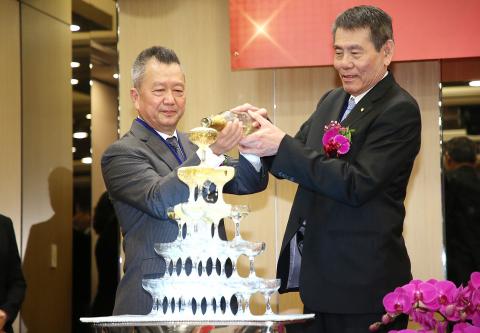Aerospace Industrial Development Corp (AIDC, 漢翔航空工業) yesterday signed a letter of intent with state-owned China Airlines Ltd (CAL, 中華航空) as it moves to diversify its business into aircraft seating and components maintenance.
Minister of Economic Affairs Shen Jong-chin (沈榮津) and Minister of Transportation and Communications Lin Chia-lung (林佳龍) attended the signing at a news conference in Taipei.
AIDC, the nation’s largest civil and military aircraft manufacturer, can now provide commercial airline seats after it received a letter of design approval in May from the US Federal Aviation Administration (FAA) for its three-abreast seats, AIDC chairman Hu Kai-hung (胡開宏) told reporters.

Photo: CNA
They are suitable for narrow-body aircraft, he said.
The firm had received production approval from the Civil Aeronautics Administration (CAA) in 2017, Hu said.
Tapping into the commercial aircraft seating market would give AIDC new momentum, he said, adding that previously concentrated on supplying components such as engine cases and doors to international clients such as Airbus SE and Boeing Co, Hu said.
AIDC would work hard on a bid for about 600 economy-class seats that CAL needs as it retrofits two older Boeing 747s it plans to sell, Hu said.
As the Boeing 747 is a wide-body jetliner, AIDC would develop another prototype for seats for double-aisle aircraft and apply for certification from the CAA and FAA, AIDC senior vice president Gary Lo (羅清溪) said.
The company’s first prototype has passed the most difficult dynamic tests to ensure the seats could protect passengers from the impact of a crash, Lo said.
Although the revenue generated by the CAL seating deal would not be much, it would demonstrate AIDC’s ambition to enter this market, Hu said.
The company would also discuss what maintenance services it could provide to CAL, even though the airline has its own maintenance department, he said.
“We manufacture a lot of components for Airbus and Boeing, and if they agree, we could directly provide some of these products to CAL for their replacement needs, which would save CAL time,” AIDC spokeswoman Jennifer Chuang (莊秀美) said.
As CAL is also to remodel some of its old passenger planes into cargo planes, AIDC would like to provide assistance in airplane design and components manufacturing, where it has an advantage, Hu said.
AIDC’s maintenance business now accounts for just a small portion of its revenue, so there is a lot of room for growth, Chuang said.

Jensen Huang (黃仁勳), founder and CEO of US-based artificial intelligence chip designer Nvidia Corp and Taiwan Semiconductor Manufacturing Co (TSMC, 台積電) on Friday celebrated the first Nvidia Blackwell wafer produced on US soil. Huang visited TSMC’s advanced wafer fab in the US state of Arizona and joined the Taiwanese chipmaker’s executives to witness the efforts to “build the infrastructure that powers the world’s AI factories, right here in America,” Nvidia said in a statement. At the event, Huang joined Y.L. Wang (王英郎), vice president of operations at TSMC, in signing their names on the Blackwell wafer to

France cannot afford to ignore the third credit-rating reduction in less than a year, French Minister of Finance Roland Lescure said. “Three agencies have downgraded us and we can’t ignore this cloud,” he told Franceinfo on Saturday, speaking just hours after S&P lowered his country’s credit rating to “A+” from “AA-” in an unscheduled move. “Fundamentally, it’s an additional cloud to a weather forecast that was already pretty gray. It’s a call for lucidity and responsibility,” he said, adding that this is “a call to be serious.” The credit assessor’s move means France has lost its double-A rating at two of the

AI BOOST: Although Taiwan’s reliance on Chinese rare earth elements is limited, it could face indirect impacts from supply issues and price volatility, an economist said DBS Bank Ltd (星展銀行) has sharply raised its forecast for Taiwan’s economic growth this year to 5.6 percent, citing stronger-than-expected exports and investment linked to artificial intelligence (AI), as it said that the current momentum could peak soon. The acceleration of the global AI race has fueled a surge in Taiwan’s AI-related capital spending and exports of information and communications technology (ICT) products, which have been key drivers of growth this year. “We have revised our GDP forecast for Taiwan upward to 5.6 percent from 4 percent, an upgrade that mainly reflects stronger-than-expected AI-related exports and investment in the third

RARE EARTHS: The call between the US Treasury Secretary and his Chinese counterpart came as Washington sought to rally G7 partners in response to China’s export controls China and the US on Saturday agreed to conduct another round of trade negotiations in the coming week, as the world’s two biggest economies seek to avoid another damaging tit-for-tat tariff battle. Beijing last week announced sweeping controls on the critical rare earths industry, prompting US President Donald Trump to threaten 100 percent tariffs on imports from China in retaliation. Trump had also threatened to cancel his expected meeting with Chinese President Xi Jinping (習近平) in South Korea later this month on the sidelines of the APEC summit. In the latest indication of efforts to resolve their dispute, Chinese state media reported that